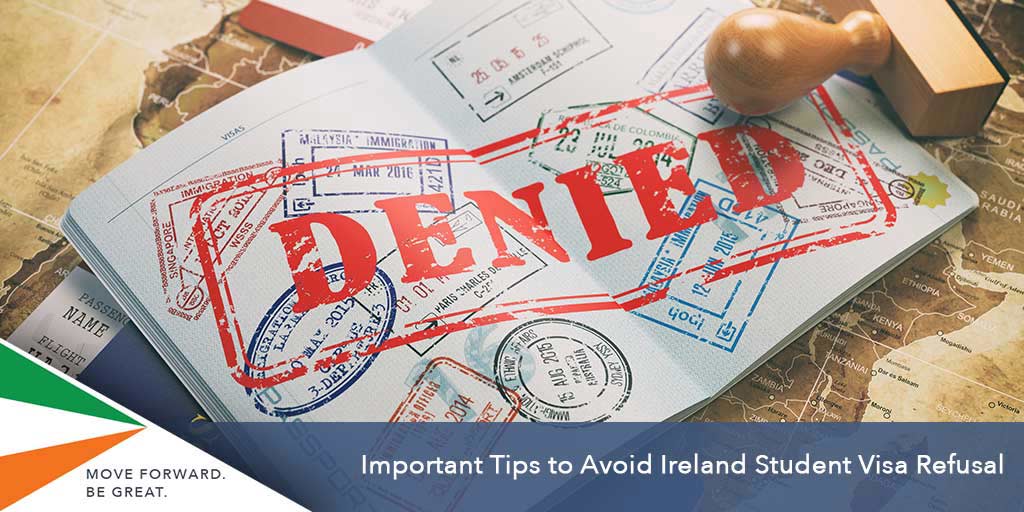If you are interested in studying a bachelor's or master's degree in Ireland, you need to have a clear idea about the Irish study visa requirements. The student visa process for Ireland is slightly different from that of countries such as the UK and the US, with Ireland having stringent funding and documentation requirements that must be followed to avoid a visa refusal. It is worth noting, however, that unlike the UK and the US, there is no visa interview for an Irish student visa.
Other important things to know before applying for an Irish study visa are mentioned below:
- A minimum IELTS score of 5 overall is needed to be eligible
- Application for a study visa can be made three months before the date of your arrival in Ireland
- The Ireland visa application processing time is around 4 to 7 weeks
- Your selected course in Ireland must fall under the Interim List of Eligible Programmes
- The duration of the course will determine the type of study visa you apply for
- A fee of €100 must be paid for a multiple entry visa
To learn more about the Ireland Study Visa application process, book a free consultation with experienced visa counsellors anywhere in the world.

Irish Study Visa Requirements
- The applicant must show sufficient funds to cover the entire study period in Ireland, including the total tuition fee of the programme and the living costs for the whole period of stay.
- It is necessary to disclose a bank statement showing sufficient funds for the last six months up to the date of visa application.
- In the case of a sponsor, all relevant documents proving his/her financial capabilities must be submitted.
- Proof of the relationship between the sponsor and the applicant must be provided.
- The applicant should be able to prove the source of all funds satisfactorily.
- Regarding bank loans, supporting financial documents and bank letters are necessary.
- Applicant must disclose their previous travel/ immigration history.
- The student must explain satisfactorily any gap between study and employment through supporting documents.
- There must be a logical pathway for the proposed course of study in Ireland.
- Applicant must demonstrate a clear intention and plan to return to their home country.
- Applicant must submit a Police Clearance Certificate.
- A copy of the medical insurance must also be attached to the visa application.
Top Reasons for Irish Study Visa Rejections
- Insufficient financial documentation: One of the primary reasons for visa rejections is inadequate financial documentation. Applicants must demonstrate that they have enough funds to cover tuition fees, living expenses, and other associated costs during their stay in Ireland. Failure to provide sufficient evidence of financial capability can lead to visa refusal.
- Lack of genuine intent: Visa officers assess whether applicants genuinely intend to study in Ireland and return to their home country afterwards. The visa may be rejected if an applicant's motives are perceived as dubious or if their application contains inconsistencies.
- Incomplete or inaccurate application: Mistakes or omissions in the visa application form, such as providing incorrect information or omitting required documents, can lead to visa rejection. To avoid such issues, reviewing and carefully completing all application sections accurately is essential.
- Inadequate English proficiency: Since English is the primary language of instruction in most Irish universities, applicants may be required to demonstrate proficiency in the English language through standardized tests such as IELTS or TOEFL. Visa rejections can occur if applicants fail to meet the minimum language requirements.
- Criminal record or security concerns: Applicants with criminal records or those deemed a security risk may face visa rejections. Visa officers may refuse applications if they have concerns about the applicant's background or if they pose a potential threat to public safety or national security.
- Previous immigration violations: Applicants with a history of immigration violations, such as overstaying a previous visa or engaging in unauthorized work, may encounter difficulties obtaining a study visa for Ireland. Past breaches of immigration rules can negatively impact visa decisions.
- Lack of supporting documents: Failure to provide all required documents, such as academic transcripts, letters of acceptance from educational institutions, or proof of accommodation arrangements, can result in visa rejection. It is crucial to adequately submit all requested documents to support the visa application.
Tips to Avoid an Ireland Student Visa Refusal
- Thoroughly review requirements: Carefully review the visa requirements provided by the Irish Naturalisation and Immigration Service (INIS) or the nearest Irish embassy/consulate in your country. Ensure you understand all the necessary documents and eligibility criteria before applying.
- Plan: Begin the visa application process before your intended travel date. This allows sufficient time for gathering required documents, scheduling appointments, and addressing potential issues.
- Provide accurate information: Ensure that all information in your visa application, including personal details, financial statements, and academic qualifications, is accurate and consistent with supporting documentation.
- Financial preparedness: Demonstrate adequate financial resources to cover tuition fees, living expenses, and other associated costs during your stay in Ireland. Maintain transparent and verifiable financial records, such as bank statements or sponsorship letters.
- English Language proficiency: If required, attain the necessary level of English language proficiency by taking standardized tests such as IELTS or TOEFL. Submit valid test scores that meet the language requirements of your chosen institution.
- Genuine intentions: Clearly articulate your genuine intentions for studying in Ireland, including your academic goals, career aspirations, and reasons for choosing Ireland as a study destination. Provide a compelling statement of purpose that aligns with your chosen course of study.
- Submit complete application: Double-check your visa application to ensure all required documents are included, accurately completed, and properly organized. Incomplete or inconsistent applications may result in delays or rejections.
- Follow instructions: Adhere to the instructions provided by the visa application authorities regarding the submission process, supporting documents, photograph specifications, and other relevant details. Failure to comply with instructions could lead to application rejection.
- Maintain transparency: Be transparent and forthcoming in your interactions with visa officials. Provide truthful and comprehensive responses during interviews or additional inquiries, demonstrating your sincerity and credibility as an applicant.
Study in Ireland
Enquire now with SI-Ireland and learn more about the available courses, universities and scholarships ahead of the upcoming intake, as well as how we can help you secure a student visa.








